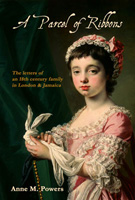One of the things I love about genealogy is tripping over a discovery while looking for something quite different. Earlier this week I was working my way slowly through the Kingston marriage register when a name suddenly jumped out at me – nothing whatever to do with the person I was looking for.
If you are a regular reader of this blog you may remember I have previously written about Scudamore Winde who spent many years as a merchant in Kingston, dying there in 1775. He was the son of John Winde and Mary Scudamore who had married at Kentchurch in Herefordshire in January 1728. Their first child Mary was baptised at Kentchurch in December 1729. The only information I had about when Scudamore went to Jamaica related to the fact that his father had committed suicide in October 1759, after which he had sold a family property at Twickenham and left for Jamaica with his younger brother Robert. I knew nothing of any earlier connection with Jamaica.
Now suddenly there was the name Maria Scudamore Winde in the Kingston parish register five years earlier. It is not a common name and therefore I have no doubt that this was Scudamore Winde’s sister who was three years older than him.
On the 2nd of October 1755 at Kingston she married Gershom Williams Esquire. To date I have no idea why she was in Kingston and whether her father had a previous connection with Jamaica, which seems likely. At twenty-six she would not have required her father’s permission to marry, but it would have been conventional and perhaps he was present. Indeed that could explain why Scudamore Winde went there after his father’s death, possibly picking up the reins of a merchant house his father had established there.
So I went in search of Gershom Williams and thanks to the Jamaican family search website and an abstract from Caribbeana I found a Will written in December 1759 by William Williams of the parish of St Anne Jamaica. The Will begins in conventional fashion requesting his executors to pay all his just debts and then deals with the disposal of Flatt Point and Woodstock plantations and sugar works, together with a plantation pen and pimento walk and a Mansion house in the parish of Saint James. These were being put in trust, with the trustees being Robert Arcedeckne and Zachary Bayly both of Jamaica, and Michael Atkins a Bristol merchant. The money raised was to be devoted to a cause referred to as “the Hospital for the Maintenance and Education of exposed and deserted young Children in Lambs Conduit Fields London”. This was the Foundling Hospital established by Thomas Coram about fifteen years earlier to provide for the needs of abandoned babies and children, and was indeed a worthy cause.
The Will went on to leave £500 Jamaican apiece to a niece and nephew and then – “Item I give and bequeath to that most abandonedly Wickedly Vile detestable Rogue and Imposter who hath assumed and now does or lately did go by the name of Gershom Williams pretending to be a Son of mine one Shilling only to buy him an Halter wherewith to hang himself being what he hath for a long, long, very long while past Merited and deserved from the Law and hands of the Hangman for his great and manifold Villanies.”
What on earth had Gershom Williams done? Was he really the son of William Williams, or a conman who had been passing himself off as his son? In either case William Williams had thought it important to include him in his Will. Today we sometimes refer to someone being cut off without a shilling, but the importance of leaving somebody only one shilling, or one penny, or some very small amount of money, was that it would prevent them from contesting the Will on the grounds that they should have been included.
It appears that William Williams actually made an earlier Will dated the 26th of May 1759 leaving the plantations to his son William Williams and the remainder to the trustees to sell on behalf of the Foundling Hospital, however by December of that year his son William had presumably died and the Will was revised, leaving the majority of the estate for the benefit of the foundlings.
There is a reference in the catalogue of the Beinecke Lesser Antilles Collection at Hamilton College[1] to articles of agreement between Gershom Williams of Jamaica and the governors of the Foundling Hospital, dated October 1763, by which Gershom Williams agreed to pay £4,500 to the Foundling Hospital by instalments in return for the governors assigning their interest in all the estates of William Williams to the use of Gershom Williams. Did the Foundling Hospital ever receive the money?
If Gershom Williams had pulled a fast one he did not live long to enjoy it.
Maria Scudamore Williams was buried in Kingston on the 17th of December 1763. Following the death of William Williams, and barely two months after the death of his first wife, Gershom Williams remarried and in his own Will, dated September 1765, he left most of his worldly goods to his “faithful and beloved wife Anna Williams”, formerly Anna McNeal and to his brother Job Williams.
Administration of the will of William Williams was finally granted in 1768 to John Edwards who was Zachary Bailey’s attorney. Robert Arcedeckne was by then living in North America, and Michael Atkins had died.
And what had Gershom Williams done that so alienated his father?
I have absolutely no idea, and if anyone can tell me what his supposed or actual crimes were I would love to hear about it.


